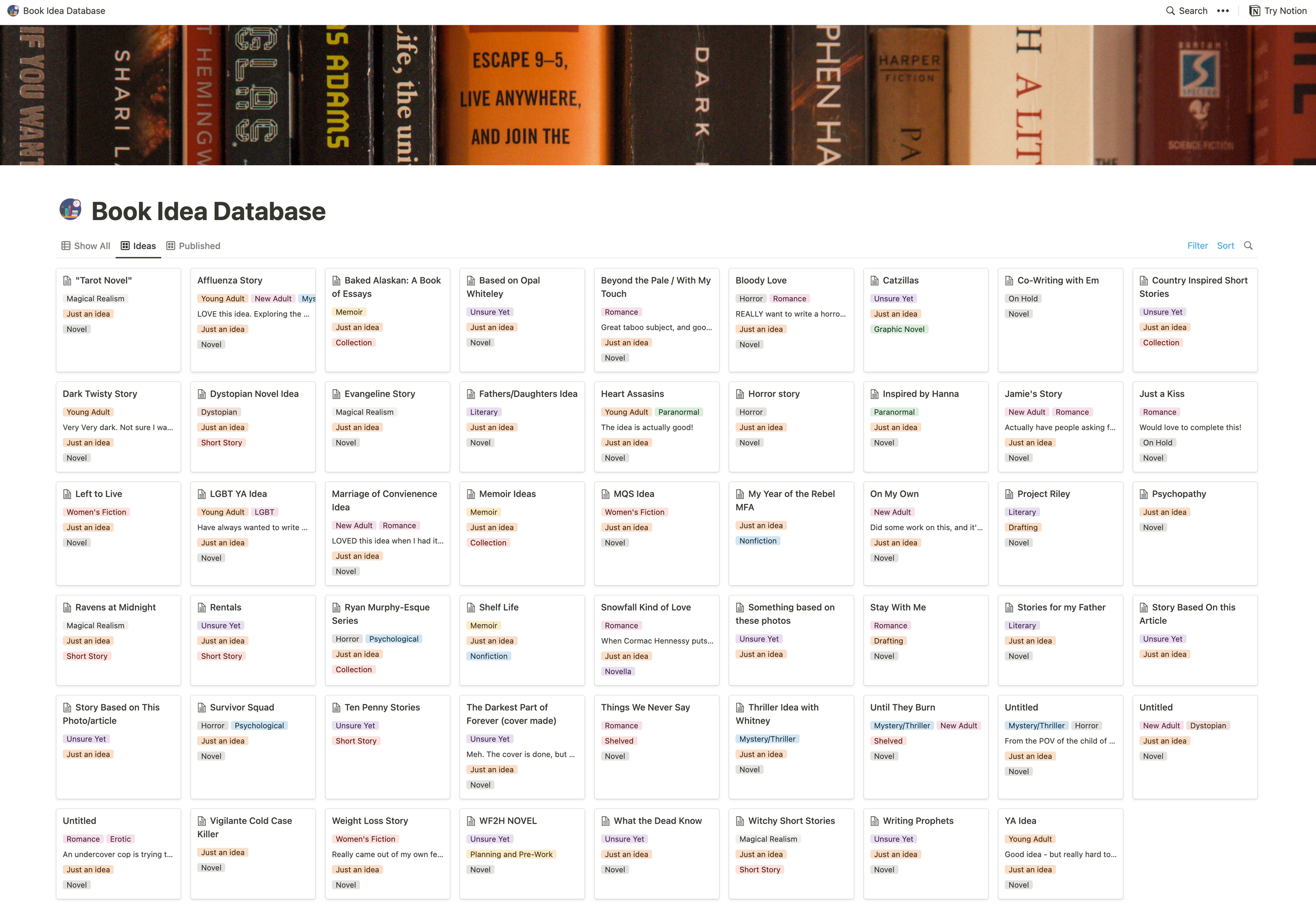Resurrecting the Dead
Let’s be honest — this article is not about resurrecting human beings. But it is about reviving what we believed or thought was dead… until it wasn’t.
If you’re a writer — or really, any sort of creative — then you’re probably familiar with the feeling of starting a project and leaving it behind for varied reasons (too busy, your heart wasn’t in it, another project came up, life obligations, etc.,). If you’re like me, sometimes revisiting these projects can feel an awful lot like grieving or feeling that pang of regret for not getting back to it. There are hundreds of first attempts, half-written drafts, fully outlined ideas, and even a few full-length manuscripts that collect proverbial dust. Here is an example of my Book Ideas Database (and this doesn’t even touch how many ideas/stories/drafts are elsewhere on my computer).
A Few Months Ago
Until this year, I avoided looking at these digital graveyards for fear of the shame spiral that usually accompanies it. Although, sometimes, I even looked at it to purposefully beat myself up. My internal dialogue would sound something like this:
“Look at all these wasted opportunities...”
“Why couldn’t you finish any of these? What’s wrong with you?”
“You loved that idea. Why didn’t you commit to it?”
“You suck — look at all these projects that could be out in the world if you’d only have had the {talent, resolve, commitment, time, energy, desire, persistence} to finish it...”
You know, we can be really mean to ourselves, sometimes. And often, we forget to take our own advice that we so liberally dole out. But then, sometimes, we surprise ourselves. We find a project we thought was dead and gone actually isn’t.
This first happened to me years ago when I was in the middle of a creative rut. I couldn’t focus or commit to the novel I was working on. I felt creatively dry and uninspired. In an attempt to locate a scene I’d written for a different project, I stumbled upon an old idea that had about 3k words written. As I reread my notes for it and the reasons behind writing it — I realized that I felt even more aligned with the story idea than ever. And the 3k words? They weren’t half bad. I decided to try going back to it again.
Six months later, I had the first draft of Lost in NYC done. Not only had it been exactly what I needed to work on at that time in my life, but I also had a new level of inspiration for it. Distance makes the heart grow fonder and all that.
Back in April, while working on one of my Rebel MFA Degree classes, I decided to look through some of those old ideas and drafts again — even though I thought I’d already committed to a story that I’d been sitting with for the past year. I didn’t expect to find anything. Lighting doesn’t strike twice in the same place, right?
I was wrong.
One of the previous novel attempts I found had 15k words. And as I read them, I thought to myself, “Wait... did I write that? This is actually kind of good...” And then I reread all of the notes and pre-work for that novel, and it clicked into place.
This was the novel I was supposed to be writing at this moment. The premise, the emotions, the plot — it all came down to a particular part of healing that I had attempted to do at that time but wasn’t ready to face.
I’m older and wiser (debatable), and I can see how much growth has happened between then and now. And yet! Still! The pages surprised me with how much I’d intuitively written. I couldn’t have known then that I would need this book at this time in my life. And I couldn’t have known that the healing aspects of it would be imperative.
And yet, here I am — lightning struck twice after all.
I argued with my internal critic for a hot minute about whether or not I should move forward with this “old-new” idea and story. Was I just looking to avoid doing the hard work required for the other novel? Was this one calling to me because of procrastination and avoidance? My internal critic wanted me to find something “wrong” with the scenario because the other story I had to tell would be an emotional one to write.
So I did the work of revising the first couple of chapters, and I submitted it to my workshop for review. I was expecting to hear negative thoughts, but I was wrong… again.
They loved it! So many of my peers (and even the instructor) encouraged me to continue because I had something special here.
Guess what happened?
I let it go. Again. Right after the workshop, my dog Laina started having seizures, my mom was in and out of the hospital, my sister was planning a move back to Iowa, and I had enough shit on my plate to make the executive decision: I’ll put it down again.
The Present
Earlier this week, something completely cosmic and woo-woo happened to me (that’s an entirely different story for another time) around writing. And once again, I was placed in the position of needing to find work to submit for an application.
But this time — I didn’t have to look for what I wanted to submit… I knew.
So I pulled out that same story that I’d submitted to my workshop, re-read it and the comments I received, and thought again:
Why did I let this one go? Why haven’t I been able to write this damn story once and for all?
Well, it’s because it’s going to be a hard one to write. It scares me because I know its potential. I know what it could be, and I’m scared of failing myself. I’m terrified to reanimate the corpse of something that could be even better if I tried to see it through.
Why tell you all of this?
Because this is a “behind-the-scenes” piece. An honest look, as you will, at the reality of how projects are born and birthed into the world. More often than not — it doesn’t look like the glamorized versions we hear or see from writers. It’s not an “I thought of this idea, I stuck with it completely from start to finish, and now here it is in the world.”
Like healing, writing novels is often cyclical and iterative. We think it looks like a straight path from point A to point B when really it looks more like the blue squiggles going up and down and this way and that. As evidenced by my very basic illustrated example below.
It also brings up a good reminder for myself of the advice I so often give to my clients and students:
Keep everything as it relates to your writing. Keep the notes, the scraps, the “silly” ideas, the half-baked attempts. Keep it all. Because you never know what you might be able to come back to. You never know when the time might be right to work on a project that you thought was dead and buried.
My amazing and supportive writing friends have given me the unofficial nod to keep going.
“You have to,” they say. “This is it, Jade. The project.”
Is it? Do I have it in me to bring this project back to life? Can I do justice to the ideas I have about it in my head?
I’m not sure I will ever have an adequate answer, but I know one thing — I can try.
And so I must.

